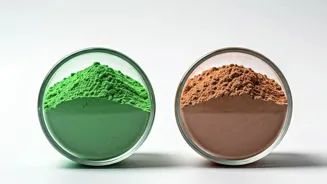Protein Powder: Muscle Builder
Protein powder is a staple for anyone looking to build muscle and aid in recovery. It's a concentrated source of protein, which is crucial for repairing
and rebuilding muscle fibers after exercise. Different types of protein powder exist, with whey being the most common due to its rapid absorption. Casein protein is another popular choice, digesting more slowly for sustained amino acid release, often consumed before bed. Soy and plant-based protein powders offer alternatives for those with dietary restrictions. The primary benefit of protein powder is its convenience. It provides a quick and easy way to meet daily protein needs, especially for individuals who struggle to consume enough protein from whole food sources alone. Using protein powder supports muscle growth, enhances recovery, and can contribute to improved body composition when paired with a balanced diet and consistent exercise.
Creatine: Power Booster
Creatine, unlike protein powder, isn’t directly a protein source but rather an amino acid derivative. It primarily boosts the body's ability to produce energy rapidly. When you lift weights or do short bursts of intense exercise, your muscles use a compound called ATP (adenosine triphosphate) for fuel. Creatine helps replenish ATP stores more quickly, allowing you to lift heavier weights, perform more reps, and experience improved power output. Creatine also draws water into muscle cells, leading to increased muscle cell volume, which can further stimulate muscle growth. It's a well-researched supplement, and studies have shown it's generally safe for most people. Creatine is especially beneficial for those involved in high-intensity, short-duration exercises like weightlifting, sprinting, and plyometrics. It can significantly enhance performance by providing that extra burst of energy.
Choosing the Right One
The best choice between creatine and protein powder depends on your fitness objectives. If your focus is on muscle building, particularly after workouts, protein powder is an excellent choice. It provides the necessary amino acids for muscle repair and growth. If you're primarily seeking to enhance strength and power, creatine might be more beneficial, as it supports your ability to generate energy quickly. Consider that these supplements can be used together, optimizing both muscle building and performance. Some individuals prefer to take protein powder after their workouts and creatine before their training sessions, although timing isn't everything. Factors like dietary preferences, exercise intensity, and overall fitness goals should guide your decision. Both supplements are safe when taken at the recommended doses; consulting with a healthcare professional or a certified personal trainer can help tailor your supplement strategy to your individual needs.
Dosage and Usage
Understanding proper dosage is crucial for both creatine and protein powder to ensure safety and effectiveness. Typically, protein powder is consumed in dosages that align with individual protein requirements, which depend on factors such as body weight, activity level, and fitness goals. The dosage usually aligns with the product's recommended serving size, as indicated on the label. For creatine, the common practice involves a loading phase (e.g., 20 grams per day for 5-7 days) to saturate muscle stores rapidly, followed by a maintenance dose (e.g., 3-5 grams per day). However, skipping the loading phase and starting directly with the maintenance dose is also an option, though it may take longer to see results. It's crucial to drink enough water when using either supplement. Protein powder requires adequate hydration for proper digestion and absorption. Creatine draws water into muscle cells, so staying hydrated is even more critical to avoid any potential side effects.
Potential Side Effects
While both creatine and protein powder are generally safe, some side effects are possible. Protein powder, especially in large doses or for individuals with lactose intolerance, can cause digestive issues like bloating, gas, and stomach cramps. Choosing a whey isolate or plant-based protein might mitigate these issues. Creatine, too, can lead to some side effects, such as water retention (which can cause temporary weight gain) and, less commonly, stomach discomfort. Ensure you are drinking plenty of water to minimize these effects. Any supplement should be taken in moderation and according to the product’s instructions. If you have existing health conditions or concerns, consulting with a healthcare professional before starting any new supplement regimen is always recommended. Being aware of these potential side effects allows for a safer, more informed approach to using these supplements.
Making a Decision
The decision to use creatine, protein powder, or both should be based on your unique fitness objectives. If you aim to improve strength and power during high-intensity activities, creatine should be your primary focus. For those prioritizing muscle recovery and growth after workouts, protein powder is an excellent choice. If you're dedicated to muscle building and enhanced performance, incorporating both supplements can create a synergistic effect, accelerating progress. It's also essential to evaluate your diet. Ensure that you’re consuming a diet rich in whole foods, including lean proteins, complex carbohydrates, and healthy fats. Supplements are designed to complement your diet and training program, not to replace them. Ultimately, a personalized approach, considering your specific goals and physical condition, will guide your most effective strategy.













